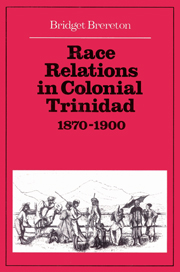Book contents
- Frontmatter
- Contents
- Acknowledgements
- Glossary
- 1 Introduction
- 2 The environment
- 3 The white elite
- 4 Education and mobility
- 5 The rise of a coloured and black middle class
- 6 The urban labouring population
- 7 The black rural masses
- 8 The souls of black folk
- 9 The Indians
- 10 Racism and race relations: the divided society
- Abbreviations
- Notes
- Bibliography
- Index
3 - The white elite
Published online by Cambridge University Press: 08 October 2009
- Frontmatter
- Contents
- Acknowledgements
- Glossary
- 1 Introduction
- 2 The environment
- 3 The white elite
- 4 Education and mobility
- 5 The rise of a coloured and black middle class
- 6 The urban labouring population
- 7 The black rural masses
- 8 The souls of black folk
- 9 The Indians
- 10 Racism and race relations: the divided society
- Abbreviations
- Notes
- Bibliography
- Index
Summary
Victorian Trinidad was a rigidly hierarchical society, in which few questioned the position of the white upper class as the political, economic, and social elite. Not all whites belonged to this elite. The Portuguese immigrants from Madeira, who of course were white, were never a part of it in this period. Nor were many persons of mainly Spanish descent who had come from Venezuela in the nineteenth century. Some of the wealthier Venezuelan immigrants, who had assimilated into Trinidad society, would certainly be considered members of the white elite. Many were well-educated and well-off; the settled immigrants were buying land and going into cocoa. There was, too, a group of ‘middle-class’ whites who could not be considered as members of the elite. They were the young men, both European and Creole, but most often English or Scottish, who were overseers on the estates, shop assistants, teachers, NCOs in the police, journalists and printers. They were on the margin of the elite, but there was always the possibility that they could move up into it: through promotion (a young store clerk might be admitted as partner to the owner; an estate overseer might be made manager), or through marriage into ‘good’ Creole or expatriate families.
The undoubted white elite consisted of two main groups: first, the British officials in the more important posts and the English and Scottish merchants, planters, and professionals resident in Trinidad, and second, the white Creoles, born in the island, descended from French, Spanish, Irish and English nationals – the ‘old families’ of the society.
- Type
- Chapter
- Information
- Race Relations in Colonial Trinidad 1870–1900 , pp. 34 - 63Publisher: Cambridge University PressPrint publication year: 1980



